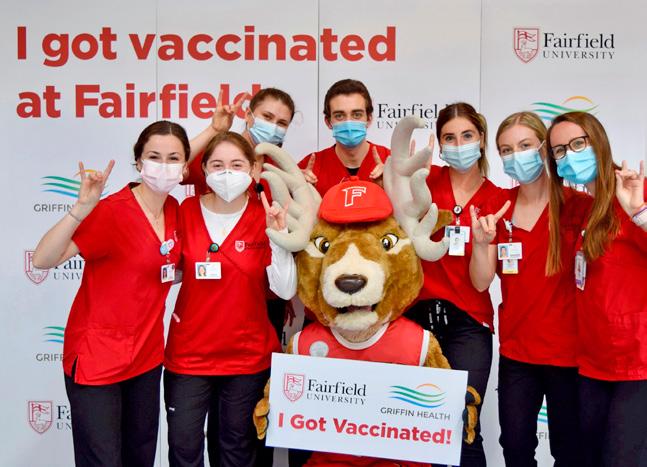
2 minute read
End-of-Life Care Curriculum Distinguishes Fairfield Nursing Programs
The Kanarek Center for Palliative Care Education (KCPC), housed in Fairfield University’s Egan School of Nursing and Health Studies, infuses palliative and end-of-life care into the nursing curriculum to enhance undergraduate, graduate, and doctoral programs.
Most people don’t associate palliative and end-of-life care with nurse anesthesia, said Nancy Moriber, PhD. “Yet nurse anesthetists must often have difficult conversations with patients and families about complications associated with anesthesia and life-threatening illnesses. By threading palliative care into our curriculum, we’re making sure our nurses are prepared to have these conversations.”
The KCPC continues to enhance course work in graduate programs. “Through the ongoing efforts of the KCPC, we intend to ensure high quality interprofessional palliative care for all people living with serious illnesses. It is our goal to empower our current and future nursing workforce to be leaders and to advocate for this type of holistic and compassionate care,” said KCPC Director Eileen O’Shea, DNP.
All of Fairfield’s nursing programs focus on patient-centered care; that is, adhering to the stated wishes and needs of the patient whenever possible. In this regard, nurse anesthetists often face unique challenges. A terminally ill patient might have a DNR (Do Not Resuscitate) order that precludes the use of intubation or a respirator, for example.
Nurse anesthetists also deal with organ donors and their families. “With an organ donor, the nurse has to keep the patient alive, monitoring blood pressure and respiration, until the transplant team is ready to harvest the major organs. Then he or she has to remove that patient from life support, which is an extremely difficult thing to do,” said Dr. Moriber. “Our students practice this in the Sim lab, and role play these conversations with families.”
Dr. Moriber and Assistant Professor Steve Belmont, DNP, are both certified in EPEC (Education in Palliative and End-of-Life Care), allowing them to train students.
The Egan School’s doctoral program, the DNP in Nurse Midwifery, also benefits from the incorporation of palliative and end-of-life care into the curriculum.
“This is one of the key ways that our program has distinguished itself,” says Program Director Jenna LoGiudice, PhD. “All midwifery programs teach the core competencies for Basic Midwifery Practice, but we see it as crucial to prepare our students to manage the many psychosocial aspects of a person’s care. Specifically, we have created perinatal palliative care and stillbirth simulations in which students use therapeutic presence and social skills to be present for families with unexpected outcomes.”
Speakers from Hope after Loss, a local Connecticut group for those who have experienced pregnancy or infant loss, have come in to speak to students, sharing concrete ways that midwives can help parents create memories of their child and to share local resources. Students also work with trained simulated patient actors, rehearsing the delivery of distressing news – after an ultrasound that detects no fetal heartbeat, for example, or outlining options for the birth and postpartum period when parents are faced with the unimaginable news that their baby is going to be stillborn.
“As you can imagine, these conversations are always challenging for midwives and obstetric providers,” said Dr. LoGiudice. “We hope that students feel that they are able to provide the highest level of care to patients and families at these times, while also knowing how important their own self-care is.”
She continued, “Shared decision-making is a big part of midwifery, and we take it very seriously. It’s a collaborative and educational model of care.” lE To learn more about the Kanarek Center, visit fairifeld.edu/kanarek.









